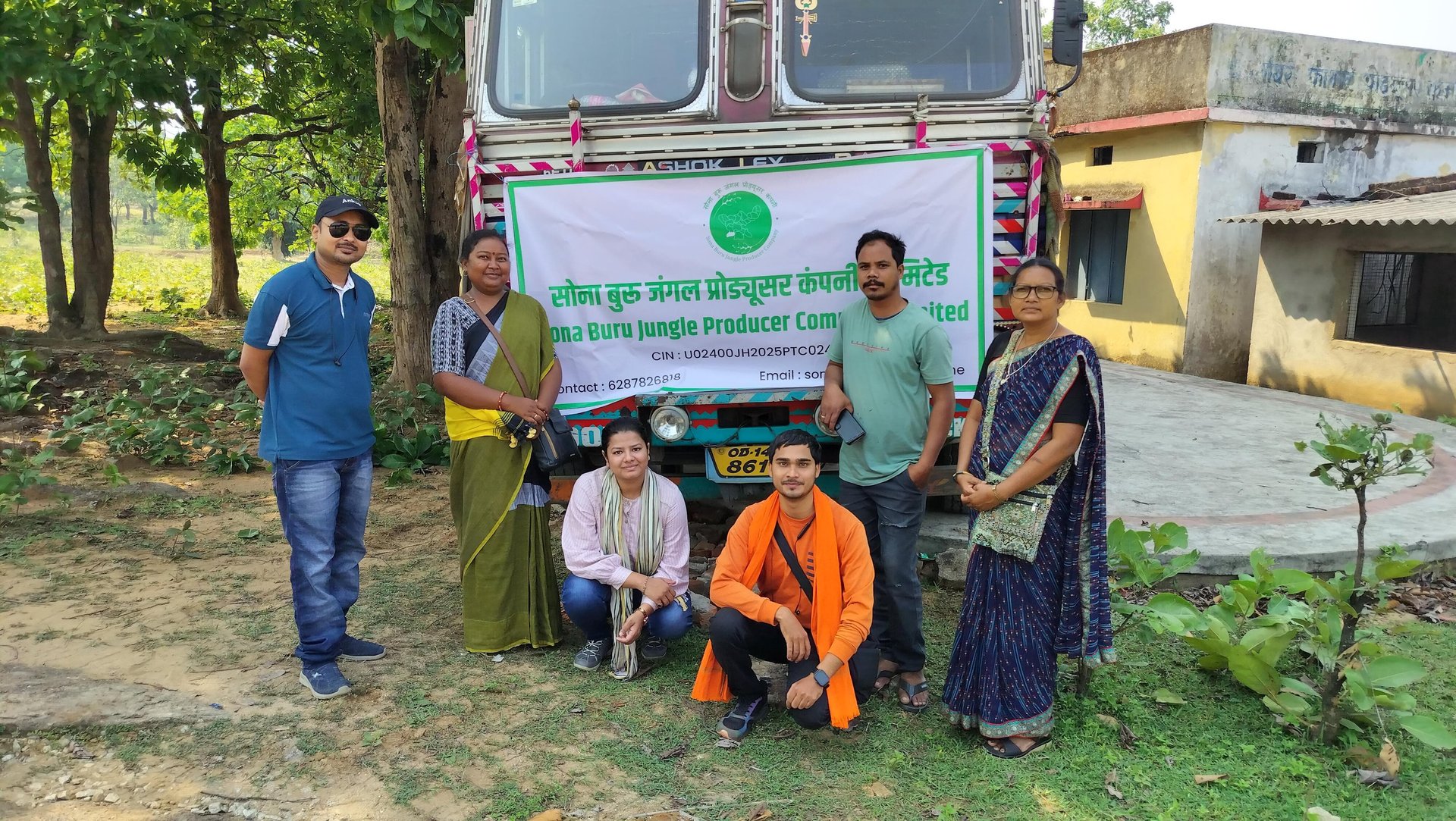
SBJPC has proven that women’s leadership and management ownership of forest-based value chains drives prosperity across diverse sectors and environments.
27.07.25
Women Transforming Forest Economy: The Sona Buru Jungle Producer Company’s Journey
In the tribal heartlands of Jharkhand, the women-led Sona Buru Jungle Producer Company (SBJPC) aggregated and sold 44.47 tonnes of sal seeds for ₹14,40,000 to AAK India Private Limited (AAKIPL) in just one month. This milestone places SBJPC among the most rapidly expanding community enterprises in India's forestry sector.
'This is just the beginning. Our goal is to bring Simdega's seasonal forest products to the right markets. Many of these products are still sold informally and fetch unfair prices. Through a formal supply chain, we want to ensure fair value and connect directly with industries,’ said Subardani Lugun, Chairperson of SBJPC.
Over 700 women from 95 villages in Jaldega, Bano, Kolebira, and Kersai blocks participated. Their swift success shows how institutional backing empowers women-led enterprises to reshape forest economies.
Industrial Partnership with Purpose
SBJPC’s sal seed sale exemplifies a new model of industrial collaboration with forest-dependent communities. AAKIPL, a prominent seed processing company, partnered directly with SBJPC, while FarMart Private Limited served as the supply chain partner, providing crucial working capital.
Alekh Sanghera, Co-founder and Chief Executive Officer (CEO) of FarMart, noted:
'At FarMart, our mission is deeply tied to India's growth, especially the kind that begins in its heartlands. Partnering with SBJPC and the Indian School of Business is more than just a collaboration; it's about supporting women-led progress and standing firm with communities that are building a stronger, more resilient future from the ground up.’
This working capital shifted financial risk away from primary collectors, enabling efficient procurement without cash-based constraints.
SBJPC integrates Community Forest Resource Management Committees (CFRMCs)—statutory bodies constituted by Gram Sabhas (GSs) under the Scheduled Tribes and Other Traditional Forest Dwellers (Recognition of Forest Rights) Act, 2006, commonly referred to as the Forest Rights Act (FRA). These committees ensure sustainable harvesting and transparent benefit distribution.
SBJPC plans to transfer royalties directly to GS accounts for forest management—a pioneering model of community enterprise compensating local governance for environmental stewardship. Implementation awaits the CFRMC bank account procedures.
By offering competitive rates, SBJPC entered areas where sal seed procurement was previously absent. Word-of-mouth credibility expanded its reach beyond initial blocks, drawing collectors from neighbouring districts.
Within weeks of incorporation, SBJPC’s Board of Directors (BoDs) ran awareness campaigns and shareholder drives, establishing the company as a credible market player. This blend of business acumen and community organising underpinned its rapid growth.
SBJPC’s success reflects the leadership capacity of women collectors who historically lacked market control. Subardani Lugun and her board demonstrated expertise in market dynamics, quality control, and supply chain management.
The first truckload—24.62 tonnes from 44 villages—was dispatched to AAKIPL’s Bilaspur facility at a value of ₹7,53,838, with an extra 75 kg paid in full. This transparency underscores the reliability of formal supply chains.
SBJPC's success extended through inter-company collaboration: AAKIPL offered it higher rates, prompting SBJPC to facilitate transactions for Green Shakti Producer Companies in Mayurbhanj and Keonjhar.
On 17 July 2025, SBJPC coordinated a final consignment of 19.85 tonnes of sal seeds from multiple producer companies (PCs). This collaboration strengthened the entire network rather than competing with neighbouring initiatives.
SBJPC's first-month achievements highlight several critical innovations:
Speed and scale: SBJPC went from incorporation to ₹12 lakh in sales, engaging over 500 women across 58 villages.
Industrial integration: It formed direct partnerships with major buyers while maintaining community ownership and democratic governance.
Conservation alignment: SBJPC used CFRMCs to ensure sustainable collection and reinvest royalties in forest management.
Women's leadership: The company validated women collectors’ capacity to manage sophisticated supply chains with institutional support.
Collaborative networks: SBJPC supported peer PCs, strengthening the entire sector.
SBJPC shows that formally recognising community forest tenure under the FRA enables sustainable commercial activities that benefit communities, industries, and ecosystems. This model offers a replicable framework for formalising informal forest economies without displacing community knowledge.
‘This success is just the beginning,’ said Subardani Lugun. SBJPC plans to expand into other seasonal forest products while upholding fair pricing, sustainable collection, and women's leadership.
